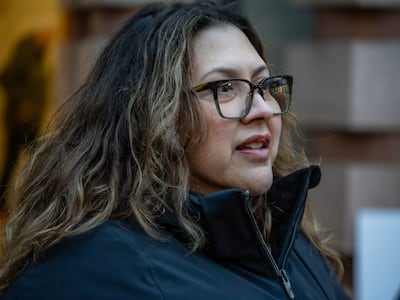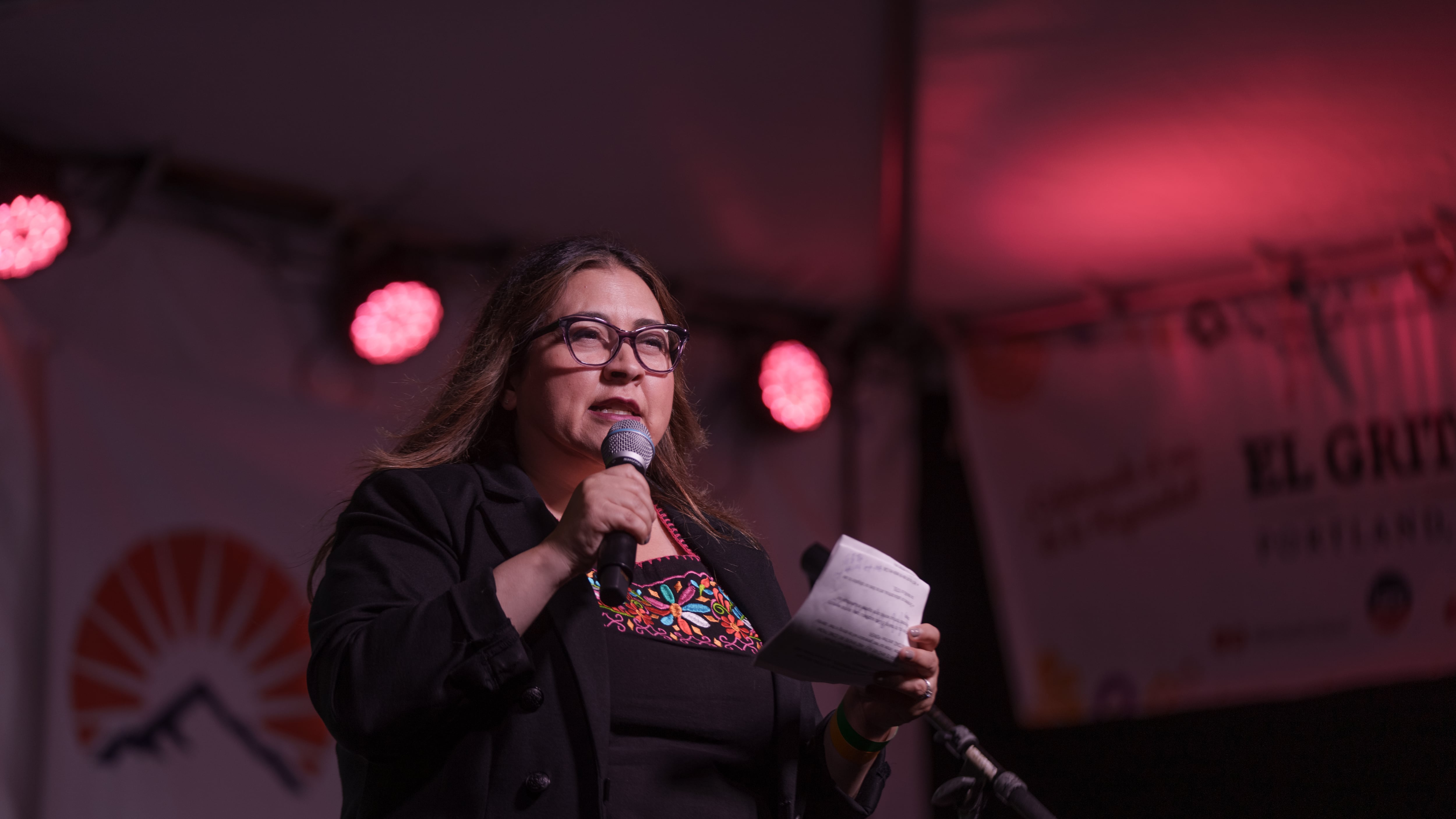With a venti vanilla Frappuccino from Starbucks in one hand, Carmen Rubio holds a three-page list of accomplishments in the other. She leans forward in the lawn chair on her Rose City Park porch, giving the pages a little flick every time she makes a point.
“I’m the only one that’s delivered results,” Rubio says.
Even her critics would concede that Rubio, who ran the nonprofit Latino Network for 10 years prior to election as a Portland city commissioner in 2020, has done a lot over the past three years: slashing the bureaucracies that slow construction permits, cutting environmental costs for housing developers, and plugging budget holes with a climate tax dollars.
But none of that is converting into momentum for Rubio’s bid to become Portland mayor. With one month left before ballots are mailed to voters, her campaign is flat.
Despite a gradual shift to the center that has pleased business leaders, close observers of the mayor’s race say Rubio hasn’t found a message that resonates with voters with the immediacy of her rival, Rene Gonzalez, who pledges zero tolerance for drug markets and sidewalk camping. In her public appearances, Rubio speaks with little vigor or emotion. Peering over a lectern at barely 5 feet tall, she often reads from an iPad in stilted sentences. She and her supporters struggle to boil her message down to talking points. Perhaps that’s why The Oregonian’s report last week that her driver’s license has been suspended six times hit Rubio so hard—it could define her.
“For those people that are upset, that just want change, irrespective of what that change may be sometimes, that’s what Rene is tapping into. That anger,” says Multnomah County commissioner candidate Vadim Mozyrsky, who is also running on a law-and-order pledge. “Carmen is talking about her ability to get things done, but she’s not connecting with the voters that are frustrated and upset.”
When asked what her campaign motto is, Rubio fumbles for a sentence.
“This is the problem for me. I get in the weeds,” she finally says. “I guess my mission statement is: Putting in the good work gets you to where you want to go.”

Rubio, 50, grew up in Washington County, the only child of a father who worked for the sheriff’s office and a mother who worked in public policy, including for a policing institute and later for Portland Mayor Tom Potter.
She was close with her aunts and uncles and cousins, all tied together by grandparents who emigrated from Mexico and made their way up the West Coast working on fruit and vegetable farms during the summer.
As a child, Rubio’s nose could often be found in the Judy Blume or Beverly Cleary books her mother brought home for her. “She’d write little notes in the books, like ‘This is for you,’ ‘This is why I read this book,’” Rubio recalls. “I felt really special.”
A self-proclaimed nerd in high school and college, Rubio went to the University of Oregon on a full scholarship, majoring in political science with a minor in ethnic studies.
Rep. Rob Nosse (D-Southeast Portland) overlapped with Rubio in Eugene since they were both involved in student advocacy clubs and traveled to conferences. Nosse remembers her as quiet but sarcastic and opinionated.
“She’s not a showboater,” Nosse says. “She’s a sit-down-and-get-crap-done human.”
In 1998, fresh out of college, Rubio became campaign field director for an up-and-coming progressive Latina leader named Serena Cruz, who was running for the Multnomah County Board of Commissioners. “It was very apparent in the first interview that she was articulate, sharp and committed,” Cruz recalls.
Over the next decade, Rubio would work for Cruz, Potter and City Commissioner Nick Fish before taking a job as the executive director of Latino Network. In 2009 the nonprofit had a budget of half a million dollars and, while known in the Latino community, had little political influence in Portland.
Over the following decade, Rubio grew the nonprofit from a fly-by-night organization operating out of a North Portland home to an $18 million powerhouse that held sway in both local and state politics.
“She built the hell out of that thing,” says longtime lobbyist Amy Ruiz.
When City Commissioner Amanda Fritz decided in 2019 not to run for a fourth term, progressive groups rallied around Rubio. She won in a rout, with 67% of the vote.
“She was anointed to her council position,” one political adviser recalls. “For years there was this thing of, when are we going to get Carmen to run?”
In her first two years on the City Council, Rubio had few accomplishments of note to her name. She oversaw anodyne bureaus, among them Portland Parks & Recreation.
One former top staffer at City Hall calls Rubio’s office in its early days a “wokey-woke operation.” That insider points to an April 2021 vote, championed by Rubio, in which the City Council allocated no new dollars to the Police Bureau to reduce shootings in city parks but instead directed $1.4 million to hire additional unarmed park rangers.
Things started to change, onlookers say, when Jillian Schoene, an experienced and driven campaign operative who had run the political academy Emerge, became Rubio’s chief of staff in late 2021.
“Jillian brought a level of sophistication and discipline to Rubio’s office,” says Sam Adams, a former top aide to Mayor Ted Wheeler. “She’s a deeply political and policy-oriented person.”
A lot changed for Rubio in 2023. She married her husband, Tony Nickles, that August and became stepmother to his teenager.
And surrounded by a blustering group of male City Council members, including Gonzalez, Rubio began to get things done.
After a monthslong fight with public works Commissioner Mingus Mapps in summer 2023, Rubio managed to convince the City Council to consolidate the city’s fractured permitting systems under one office, cutting the red tape that had delayed developers from building homes for months and sometimes years.
Eric Zimmerman, a former staffer to Wheeler, says Rubio did what city leaders had failed to tackle for 25 years. He says she fought the “institutional animal that’s the hardest to change”: bureaucracy.
Mapps was backed by the directors of public works bureaus, who didn’t want their fiefdoms disturbed. Four of them wrote an open letter condemning Rubio’s plan—and she countered by rallying the private sector, including homebuilders and the chamber of commerce.
Former Water Bureau director Gabe Solmer was one of those who signed the opposition letter. She now says she made the wrong decision. “She was right,” Solmer says—and adds that prior to working with Rubio on permitting, she thought of her as a blank slate. Solmer concedes she was hasty in making assumptions.
“I was surprised at how adept she was at getting us to the right solution,” Solmer says.
Politically, Rubio’s consolidation impressed the city’s most influential and deep-pocketed industry groups, Gonzalez’s most coveted supporters.
Similarly, newly appointed to lead the Bureau of Development Services in 2023, Rubio asked developers and builders which of the city’s construction regulations—bird-safe glass and bike parking among them—were the most onerous and costly. In early 2024, Rubio successfully nixed bike parking requirements, eased zoning restrictions, and lessened eco-roof rules.
That showed political savvy. She impressed business and development groups—her skeptics—by showing a willingness to kill some long-standing progressive regulations popular with her base.
That became something of a pattern for Rubio. Early this year, she had to decide whether to take a major policy step that would annoy the nonprofit community she hailed from.
The dilemma was by some measures an enviable one: Rubio was staring down $540 million in unanticipated revenues from the Portland Clean Energy Fund tax, a corporate sales tax voters approved in 2018 to fund climate infrastructure projects and jobs for low-income communities of color. (Rubio oversaw the fund because it was housed in the Bureau of Planning and Sustainability, which Mayor Wheeler assigned her.)
Rubio proposed funneling all the excess revenue into climate-adjacent projects within city bureaus that were facing budget shortfalls. Initial pushback from nonprofit leaders, the sector that expected to receive the excess PCEF dollars, seemed to die almost as quickly as it rose. Onlookers credit Rubio’s preexisting relationships with nonprofit leaders as a balm only she could have applied after redirecting money they anticipated.
“I kept thinking, there’s going to be an outcry about this. And there really wasn’t,” Solmer says. “When we don’t see things blow up, we think, that must have been easy. But it wasn’t easy.”
The trio of shifts to the center—permitting consolidation, regulatory relief and PCEF cash diversion—impressed the business community. It was enough to neutralize them in the mayor’s race: United for Portland, the political action committee set up by the Portland Metro Chamber, will not endorse a candidate in the mayoral race, nor does it plan to spend money in support of Gonzalez.
Three policy fights, three wins. But here’s the nagging question: Did any of them change the trajectory of the city?
“It’s fine, but we have to do so much more,” Ruiz, the lobbyist, says. “We need bolder ideas if we’re going to move the needle on this one.”
Rubio’s accomplishments don’t solve the biggest problem in her bid for mayor. One political consultant, speaking on the condition of anonymity, calls Rubio’s campaign “utterly underwhelming.”
Mozyrsky says Rubio’s campaign platform is so broad that it doesn’t tap into voters’ top two priorities: homelessness and public safety.
“Her speeches are uninspiring,” Mozyrsky says. “People are looking for a sense of urgency.”
Rubio’s backers say that analysis is gendered and unfair. “They want the mayor to be a personality,” Rep. Nosse says, “and that’s just not who she is. And I say to that, so what? Don’t we want someone who’s a grown-up?”
Similarly, both critics of Rubio and some of her supporters say Rubio’s power comes from Schoene, her sharp-elbowed chief of staff, raising the question: Is Rubio a strong policymaker herself, or just deftly managed?
“Jillian is the right alter ego for Carmen,” Adams says. “She doesn’t hold back and can be intense, and that’s fine with me.”
Rubio, for her part, calls such criticism offensive.
“I have very good self-awareness of where I’m strong and where I’m not. And I will tell you that Jillian is a great soldier for me,” Rubio says. “But ultimately it’s my decision.”
Last week was a difficult one for Rubio and her campaign: The Oregonian revealed Rubio’s dismal driving record, including 150 parking and driving tickets and six license suspensions.
On a Friday afternoon phone call with WW, Rubio sounded fatigued.
“I’ve been underestimated my entire life,” she says. “But you know what? I still won the seat. I still passed all these things in three years. Have they done that? You can’t be thin-skinned. You can’t just pound your fist all the time. You got to back it up with action.”

